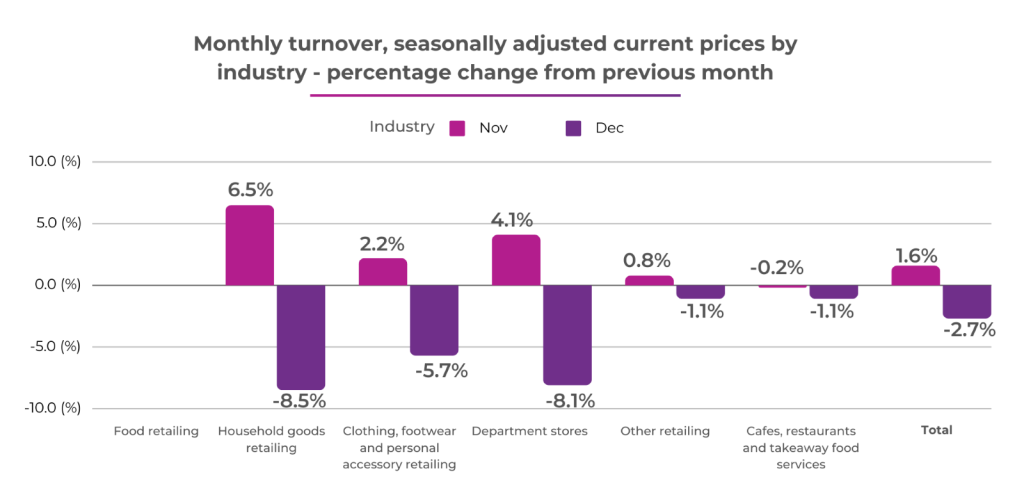Rising interest rates and the effect of sticky inflation driving price rises together with a slowing in the labour market have had a significant impact on household disposable income. Household disposable income is a key driver for the retail sector and consequently these factors are negatively affecting demand in the sector.
Evidence is backing this up as retailers faced a subdued consumer spending month in December 2023, with retail turnover falling by 2.7%. November 2023 recorded a rise of 1.6%.
Retailers in the food and non-food industry faced a fall in turnover following the November sales spike. Here is an overview of the retail industry’s December turnover:
Retail non-food industry performance MoM (Nov/Dec)
- Household goods down by 8.5%
- Department stores down by 8.1%
- Clothing, footwear, and personal accessory retailing down by 5.7%
- Other retailing down by 1.1%
Retail food industry performance MoM (Nov/Dec)
- Cafes, restaurants and takeaway food services down by 1.1%
- Food retailing up by 0.1%

ABS Head of Retail Statistics Ben Dorber claims that trading slowed in early December following ‘the success of Black Friday.’
“The large fall in retail turnover in December was caused by a fall in discretionary spending. Consumers brought forward some of their usual December spending to November to take advantage of Black Friday sales,” says ABS Head of Retail Statistics Ben Dorber.
“This shift in spending from December to November reflects the growing popularity of Black Friday sales and the impact of cost-of-living pressures, with consumers seeking out bargains and taking advantage of discounts in November.
According to Australian Retailers Association CEO Paul Zahra, the fall in year-on-year growth reflects the cost-of-living pressure consumers face today.
“With household budgets under pressure, Christmas in 2023 was somewhat subdued compared to previous years – a result of cost-of-living challenges. We aren’t seeing the year-on-year growth that we did in previous years,” he said.
“With high interest rates and increasing costs for families, we’re continuing to see a softening in discretionary spending … Another interest rate increase would be crushing for retailers.”
Interest rates unchanged in RBA’s first board meeting of 2024
Recent interest rate updates show the Reserve Bank of Australia retained the cash rate at 4.35%. Its first board meeting for 2024 has left the interest rate unchanged for a second meeting in a row.
The retaining of interest rates was widely forecasted by economists, as inflation pressures were seen easing last year. But it remains a ‘watch and see’ by the RBA’s board members.
“While recent data indicate that inflation is easing, it remains high,” the RBA said in a statement.
“The board expects that it will be some time yet before inflation is sustainably in the target range … The path of interest rates that will best ensure that inflation returns to target in a reasonable timeframe will depend upon the data and the evolving assessment of risks, and a further increase in interest rates cannot be ruled out.”
“While there are encouraging signs, the economic outlook is uncertain, and the Board remains highly attentive to inflation risks. The central forecasts are for inflation to return to the target range of 2-3% in 2025, and to the midpoint in 2026.”
According to Anneke Thompson, Chief Economist at CreditorWatch, market signs indicate an earlier decrease in the cash rate this year, but inflation numbers remain high at 4.1%.
“All indicators point to inflation falling faster than last year’s forecasts, and this may well result in a decrease to the cash rate sometime in the middle of the year, rather than the latter half.”
“Inflation is also falling rapidly in major overseas economies … and central banks in the US, UK and Europe are likely to consider cuts to their interest rates over the next few months,” Thompson says.
A ‘much-needed reprieve’ for retail
Paul Zahra claims that holding interest rates is a ‘much-needed reprieve’ for the retail industry, offering businesses a sense of cautious optimism.
“We’re pleased to see the RBA provide some much-needed reprieve for consumers and businesses to set the tone for the beginning of 2024,” Zahra says.
“At a time of immense financial pressure and hardship for most, avoiding another cash rate increase will positively impact spending and retail operations,”
“December’s retail performance was subdued, with cost-of-living pressures taking their toll … As a result, retailers will be looking to regain sales momentum in the months ahead.”
What’s next for retailers?
Looking at the US and Europe, inflation has been less sticky, which means central banks have been able to ease interest rates earlier than they have done domestically. The inflationary challenges in Australia are complex, but the short point is that the domestic environment is different.
As such, looking to foreign jurisdictions as an indicator of easing of interest rates domestically is fraught with danger. It’s unlikely that we will see a downward move to interest rates in 2024. That means that household disposable income is likely to remain tight, and in turn, retailers are set for another challenging year.
The key for retailers, like many other sectors, is to find opportunities to utilise their resources fully. For example, substantially improving “productivity” through boosting efficiencies and supply chain synergies, value engineering, and working smarter.
For more information, read our blog article on what lies ahead for retailers in 2024 and how they can optimise their resources.
Olvera Advisors helps businesses stay ahead in a dynamic retail environment with bespoke restructuring solutions. Explore our blog for more insights on navigating the financial complexities of this dynamic industry.
References:





